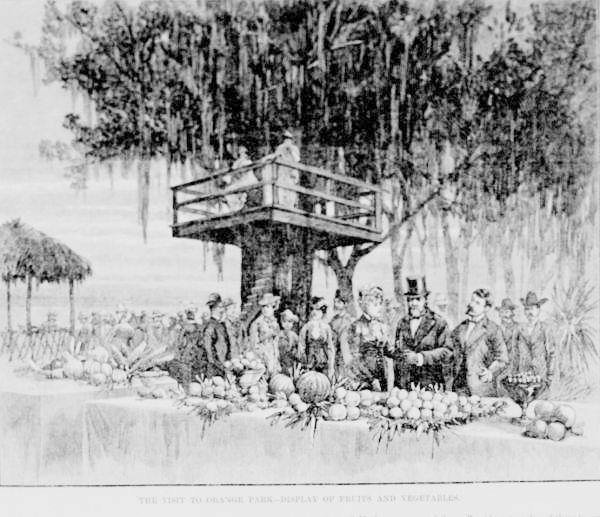Wordsmith George Barbour helped put Clay on the map
George M. Barbour, and the book he wrote, “Florida for Tourists, Invalids and Settlers,” helped build the ripples of northern infatuation with Florida into a colossal wave of humanity that …
This item is available in full to subscribers.
Attention subscribers
To continue reading, you will need to either log in to your subscriber account, or purchase a new subscription.
If you are a current print subscriber, you can set up a free website account and connect your subscription to it by clicking here.
If you are a digital subscriber with an active, online-only subscription then you already have an account here. Just reset your password if you've not yet logged in to your account on this new site.
Otherwise, click here to view your options for subscribing.
Please log in to continueDon't have an ID?Print subscribersIf you're a print subscriber, but do not yet have an online account, click here to create one. Non-subscribersClick here to see your options for subscribing. Single day passYou also have the option of purchasing 24 hours of access, for $1.00. Click here to purchase a single day pass. |
Wordsmith George Barbour helped put Clay on the map
George M. Barbour, and the book he wrote, “Florida for Tourists, Invalids and Settlers,” helped build the ripples of northern infatuation with Florida into a colossal wave of humanity that crashed onto the state in the last decade and a half of the 1800s.
At first it was word of mouth from returning Union soldiers who regaled friends and neighbors through withering, dismal winters. They told tales of a place where snow, ice and freezing wind were strangers, a place where sweet fruit was for the picking, game and fish were endless.
Audiences were already firmly inspired with the immensely popular Horatio Alger stories of the hero’s rise to greatness with the appropriate application of honesty, ambition and plain old pluck. Barbour’s book, first published in 1882, suggested with great detail a place and opportunity to apply these principles.
Barbour’s book was obviously not an advertising brochure but a well-researched assessment of the state. He shrewdly touched all the bases and crafted the information to satisfy a wide audience from the sickly to the ambitious fortune seeker and the newly rich middle-class tourist.
Unlike many who took it upon themselves to pen prose about Florida; Barbour had at least spent time in the state. He first toured the state on assignment as correspondent for the Chicago Times as a member of General Ulysses S. Grant’s entourage in January of 1880.
Barbour warned of what he called “land sharks” lying in wait to sell swampland and property they didn’t even own.
He took great pains to ridicule the primitive, fragments of privately constructed railway lines dotting the state. Many of the rails were wood and subject to warping in the humidity. Train crews thought nothing of drafting passengers to assist in repositioning the cars after a derailment. Travelers in close proximity to the smoke and ash-belching engine-maintained alert to pat out flying cinders that fell and smoldered on their sweat damp, wool clothing.
But … northern bankers and railroad men read his book too and were soon falling all over each other to take advantage of the opportunity for profits.
At times Barbour appears to be swept away by the beauty and uniqueness. He rhapsodizes on and on about the virgin forests and the birds, fish and fowl in copious quantities.
He was not nearly as impressed with Florida natives he called “crackers”. With the venom of a bigot he describes them as “clay-eating, gaunt, pale, tallowy, leather-skinned sort – stupid, stolid, staring eyes, unkempt hair, and of shiftless, slouching manner.”
The chapter on health and climate provides a total and unabashed endorsement of Florida. He used government climatologic charts and quoted medical experts writing in professional journals to encourage the immediate removal to Florida for anyone suffering from “phthisis, consumption, and family tendency to diseases of the lungs”. He assures the reader that, “pneumonia is unknown in Florida; so are diphtheria and small-pox.” and that the state “has never known a case of sunstroke or hydrophobia.”
As incentive to the middle-class tourists he states “The worn-out man of business, suffering from broken health will find in Florida the necessary relaxation from brain fog, opportunities to take outdoor exercise, plenty of sunshine, pure and bracing air.”
Barbour demonstrated his outrageous prejudice and shallow knowledge in some areas. He attacked native Alabama residents with poisonous rhetoric. He described them as “ignorant, shiftless, improvident, conceited and lazy and about the only class of immigrants to Florida that are useless.” Georgia residents appealed to him but he really insulted them by describing them as “regular Southern Yankees”.
After writing his book Barbour seems to have disappeared from the annals of recorded history. One can only hope that he didn’t meet up with a lazy cracker or perhaps a land shark or someone from Alabama or Georgia who happened to read his book.








